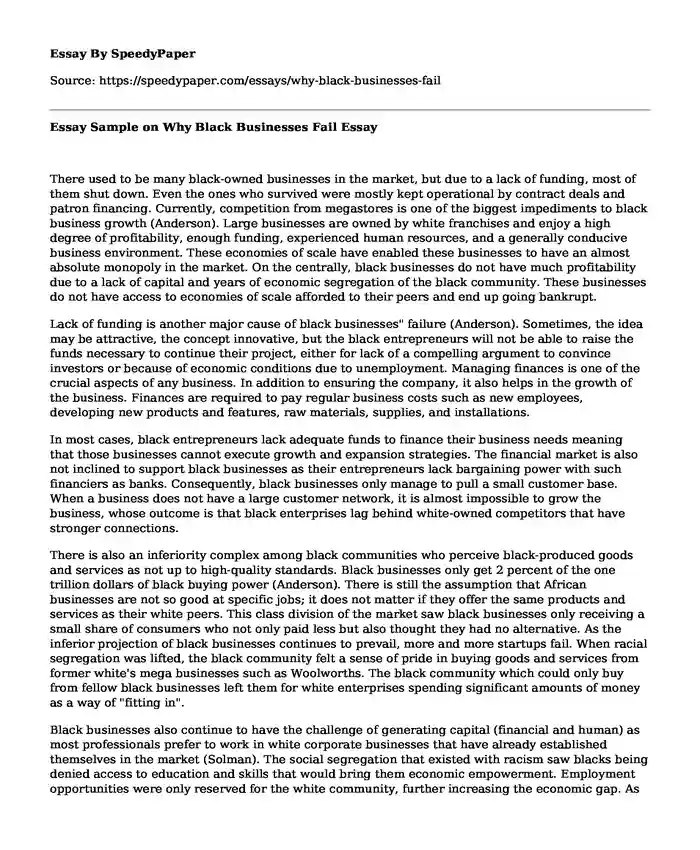
| Type of paper: | Course work |
| Categories: | Racism Discrimination Business Problem solving |
| Pages: | 3 |
| Wordcount: | 742 words |
There used to be many black-owned businesses in the market, but due to a lack of funding, most of them shut down. Even the ones who survived were mostly kept operational by contract deals and patron financing. Currently, competition from megastores is one of the biggest impediments to black business growth (Anderson). Large businesses are owned by white franchises and enjoy a high degree of profitability, enough funding, experienced human resources, and a generally conducive business environment. These economies of scale have enabled these businesses to have an almost absolute monopoly in the market. On the centrally, black businesses do not have much profitability due to a lack of capital and years of economic segregation of the black community. These businesses do not have access to economies of scale afforded to their peers and end up going bankrupt.
Lack of funding is another major cause of black businesses" failure (Anderson). Sometimes, the idea may be attractive, the concept innovative, but the black entrepreneurs will not be able to raise the funds necessary to continue their project, either for lack of a compelling argument to convince investors or because of economic conditions due to unemployment. Managing finances is one of the crucial aspects of any business. In addition to ensuring the company, it also helps in the growth of the business. Finances are required to pay regular business costs such as new employees, developing new products and features, raw materials, supplies, and installations.
In most cases, black entrepreneurs lack adequate funds to finance their business needs meaning that those businesses cannot execute growth and expansion strategies. The financial market is also not inclined to support black businesses as their entrepreneurs lack bargaining power with such financiers as banks. Consequently, black businesses only manage to pull a small customer base. When a business does not have a large customer network, it is almost impossible to grow the business, whose outcome is that black enterprises lag behind white-owned competitors that have stronger connections.
There is also an inferiority complex among black communities who perceive black-produced goods and services as not up to high-quality standards. Black businesses only get 2 percent of the one trillion dollars of black buying power (Anderson). There is still the assumption that African businesses are not so good at specific jobs; it does not matter if they offer the same products and services as their white peers. This class division of the market saw black businesses only receiving a small share of consumers who not only paid less but also thought they had no alternative. As the inferior projection of black businesses continues to prevail, more and more startups fail. When racial segregation was lifted, the black community felt a sense of pride in buying goods and services from former white's mega businesses such as Woolworths. The black community which could only buy from fellow black businesses left them for white enterprises spending significant amounts of money as a way of "fitting in".
Black businesses also continue to have the challenge of generating capital (financial and human) as most professionals prefer to work in white corporate businesses that have already established themselves in the market (Solman). The social segregation that existed with racism saw blacks being denied access to education and skills that would bring them economic empowerment. Employment opportunities were only reserved for the white community, further increasing the economic gap. As the big retailers started hiring black talent, would-be black entrepreneurs flocked into corporate business to make quick money. Consequently, the white businesses took back both money that would be reinvested in the black businesses and entrepreneurial talent.
The futility of the few existing black businesses in the context of the broader market is also a contributing factor in the failure of black businesses. Although more light has been shed on the plight of black businesses through such campaigns as "buy black", the consumer base has not tilted in favor of black-owned businesses. Many enterprises lack market independence as they source most of their providers from a mostly white segment. Even the few black-owned businesses do not fully have control over their resources, seeing the initial suppliers are dominantly white.
Works Cited
PBS NewsHour. "One Family's Effort to Buy Black for a Year." YouTube, commentary by Paul Solman, 19 June. 2012, https://www.youtube.com/watch?v=77j_lB8TXig
TEDx Talks. "My black year: Maggie Anderson at TEDxGrandRapids." YouTube, commentary by Maggie Anderson, 17 June. 2014, https://www.youtube.com/watch?v=nFBEoIQutSc.
Cite this page
Essay Sample on Why Black Businesses Fail. (2023, Mar 27). Retrieved from https://speedypaper.com/essays/why-black-businesses-fail
Request Removal
If you are the original author of this essay and no longer wish to have it published on the SpeedyPaper website, please click below to request its removal:
- Writing Assignments Essay Samples
- Essay Sample on English Second Language Adult Learners
- Free Essay with a Rhetorical Analysis of the Article How to Defeat ISIS
- Free Paper Sample on Gonorrhea Resistance and Treatment
- Case Study Paper Sample: Relationship Between Technology and Productivity
- Interacting with RAD Essay Sample
- Essay Sample on Aromatherapy As a Method of Treating Chemotherapy
Popular categories




